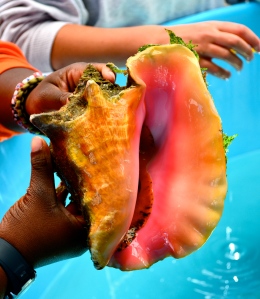[slideshow]
Since its creation just over one year ago, the Lionfish Research and Education Program (LREP) at CEI has strived to become a hub for lionfish work in the Caribbean. Recently, LREP has taken some exciting steps toward reaching this status! Just last week, CEI hosted three producers and videographers from ZED (www.zed.fr), a major French documentary company that is working on gathering footage for an upcoming TV series featuring invasive lionfish. Specifically, the documentary team was interested in learning about Bahamian lionfish research and management initiatives. Luckily, visiting scientist, and partner of LREP, Nicola Smith was able to come over from Nassau to support the week’s activities and be featured in the film! Nicola is the lead coordinator for the Bahamian-wide lionfish research project that operates under the Bahamian Department of Marine Resources (DMR) and partners with CEI.
ZED producer, Jerome Segur, sound engineer, Olivier Pioda, and underwater videographer (and former member of Jacque Cousteau’s prestigious dive team!) Didier Noirot, joined Nicola and LREP researchers in the field to get a closer look at lionfish and to better understand the project’s research objectives. Continue reading →



